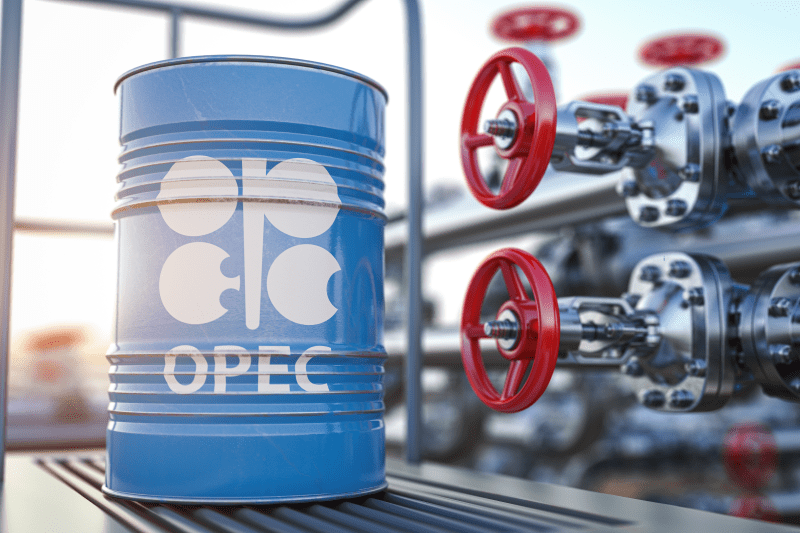The production of the OPEC + coalition of crude oil increased by 140 thousand barrels per day in December of the past year (2022), to record 42.71 million barrels per day, with increased production from Saudi Arabia and Nigeria in particular.
The 13 members of the Organization of the Petroleum Exporting Countries pumped about 28.98 million barrels per day in December (2022), up 110,000 barrels per day from November, according to a recent survey by S&P Global Commodity Insights. It was reviewed by the specialized energy platform.
For its part, the 10 non-OPEC countries, in what is known as the OPEC + alliance, added about 13.73 million barrels per day, an increase of 30,000 barrels per day.
Despite the overall increase, the alliance’s production remains far behind its production targets, with a gap of 1.80 million barrels per day in December (2022), according to S&P Global’s calculations, as most members are experiencing technical or other difficulties. financial support to maintain production.
The most prominent OPEC + numbers in December
The survey found that Saudi Arabia pumped 10.48 million bpd in December, up 20,000 bpd month over month.
It also showed that Russian volumes were around 9.86 million bpd in the month, down just 10,000 bpd from the previous month.
Meanwhile, Nigeria saw a significant recovery in its loadings of major grades Forcados and Brass River, while maintenance was completed at the Bunga field in mid-November.
The country, which is facing oil thefts and major leaks, produced about 1.33 million barrels per day in December, an increase of 160,000 barrels per day, the highest level since April.
The Republic of the Congo saw the largest drop of 40,000 bpd in the month, with a major field maintenance, when it produced 220,000 bpd, according to the survey.
While Iraq – the second largest member – produced 4.46 million barrels per day, down 30 thousand barrels per day from November.
Algeria also produced 1.01 million barrels per day, a decrease of 10,000 barrels per day.
The following table – prepared by the specialized energy platform – shows oil production shares for OPEC + countries from November 2022 to December 2023:
The repercussions of Western sanctions on Russia
All eyes remain on Russia, with most OPEC+ members pumping as much as technically possible, while Saudi Arabia, the UAE, Iraq and Kuwait – the only countries with spare capacity – maintain discipline under the quota cuts.
The Russian energy industry is being targeted by Western powers for their invasion of Ukraine, with various measures imposed to try to limit Moscow’s profits from oil and gas sales, dramatically altering flows globally.
As a result of the EU embargo, shipments of Russian-origin oil from Russian ports fell by 431,000 barrels per day, or 14%, in December from November levels, according to S&P Global tracking data.
The G-7 cap of $60 a barrel on Russian shipments, which was also implemented on December 5, has had little effect, as Urals crude has traded well below that price in recent weeks.
However, Moscow’s reliance on its refineries and storage facilities to accommodate production could be significantly limited once the EU ban on imports of Russian refined products comes into effect on February 5 (2023).
Russian oil supply disruptions are expected to reach 1 million barrels per day by March, according to analysts at S&P Global.
Reducing production.. and a cautious approach
The OPEC + alliance had agreed – in October 2022 – to reduce quotas by two million barrels per day from November 2022 until the end of 2023, in anticipation of what it saw as a decline in oil demand and the possibility of a recession in major economies.
The coalition was not affected by the European Union’s imposition of an embargo on Russian seaborne oil exports, starting on December 5 (2022), as it reaffirmed the decision at its meeting on the 4th of last month.
The OPEC+ Joint Ministerial Monitoring Committee will meet on February 1 to review market conditions and recommend any changes in production policy, if necessary.
For his part, the President of the OPEC Conference, Gabriel Mbaga Obiang Lima, called for the need to exercise caution before introducing any change in production quotas.
Obiang Lima – who holds the position of Minister of Oil in Equatorial Guinea – stressed that it would be “wise” for the alliance to wait until there is more clarity about the future of the oil market before adjusting production targets.
Speaking during a briefing organized by the African Energy Chamber, he stressed that the group should be “cautious” in planning its policy given the great uncertainties facing the market.
related topics..
Also read..

Leave a Reply